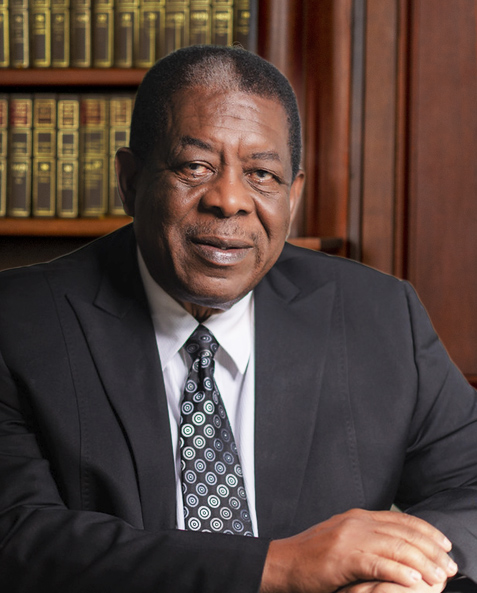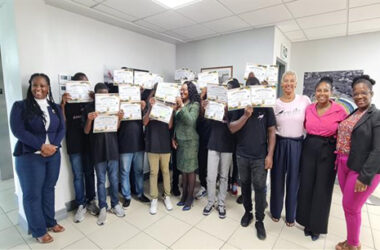
It is customary for the Chancellor of The UWI to appoint a Commission every ten years to undertake a review of the governance and structure of the University to identify ways in which the University can address challenges and institute the necessary changes to maintain its viability and standing as the premier regional tertiary educational institution in the Caribbean.
On 14th December 2018, Chancellor Robert Bermudez appointed a Commission headed by the Rt. Hon. Sir Dennis Byron (former President of the Caribbean Court of Justice; and a permanent Judge and President of the United Nations International Criminal Tribunal for Rwanda (ICTR). The other members of the Commission included:
- Mr. Richard Byles – Governor of the Bank of Jamaica
- Ms. Angela Hamel-Smith – Judge of the Industrial Court of Trinidad & Tobago
- Prof. E. Nigel Harris – Vice Chancellor Emeritus, UWI
- Dr. Didacus Jules – Director General OECS, former Registrar CXC and former Permanent Secretary for Education (Grenada and St. Lucia)
- Sir Elliott Mottley QC – Distinguished jurist, former Attorney General (Bermuda), former President of the Court of Appeal (Belize) and Former President of the Court of Appeal (Turks & Caicos)
- Mr. Darion Narine – then President of the InterCampus Guild Council
- Dr. Beverley Pereira – distinguished Legislative Drafter and former University Counsel, UWI
- Mrs. Jacqueline Sharp – UWI Alumni Association and former President and CEO of Scotia Group Jamaica
The Terms of Reference provided to the Commission by the Chancellor required that it “examine the performance of The UWI in relation to its Objects as stated in Clause 2(a) and 2(b) of the 1972 Charter, including its management practices and its features of transparency and accountability within the University system and make recommendations and report thereon to the Chancellor”.
As indicated, The UWI Chancellor’s Commission on Governance (2018) is not the first Chancellor’s Commission appointed to review the University’s governance structure. Periodic reviews are critical, as failure to treat with administrative compliance and diligence in a substantial and timely fashion can place the University at risk. Such reviews were conducted in 1982, 1992, and 2004.
The recommendations made by the various Commissions aim to respond to the internal and external challenges and circumstances of the current times. The purpose of the 2018 governance review is to ensure that the University’s governance and structure can ably support the requirement for oversight, accountability, agility and sustainability of the university in the dynamic space and time where it resides regionally.
In the execution of its mandate, the Commission undertook broad and extensive consultations across the region with all key internal and external stakeholders. These consultations included the use of focus groups, online surveys, and town hall meetings with students, academic and administrative staff, executive management, UWI Alumni, ministerial representatives of contributing countries and the general public. The Commission also read voluminously all the Reports of previous Commissions as well as other institution reports of The UWI.
In July 2020, the 142-page Report of the Commission was officially presented to the Chancellor together with two well detailed annex documents: one containing key reference documents integral to the conclusions of the Commission (730 pages) and the other describing how its consultations were conducted, and the analytics of the feedback received.
The UWI, Chancellor’s Commission (2018) Report including its annexes and the abbreviated Power Point version used for the Presentation to the Council were publicly released on the University’s website https://www.uwi.edu/chancellorscommission/), and internally disseminated.
Following the acceptance of the Report by Chancellor Bermudez, the findings and recommendations of the Commission were presented to a Virtual Meeting of the University Council held in January 2021.
Since the meeting of Council, the Commission has noted with increasing concern what appears to be an orchestrated campaign that, in the first instance, has conflated its findings and recommendations with matters related to the tenure of the Vice Chancellor and has proceeded to impute improper motives to our work that are neither reflective of the Terms of Reference nor the conclusions of our work. It is evident that time has not been taken to carefully and objectively read the Report of the Commission itself, and it appears that some persons are selectively taking issue with conclusions that have been consequently distorted.
Some of the structural and systemic governance issues identified in the report have existed and remained unchanged for a while and did not originate with anyone in the current administrative system. The Commission has recommended changes in inefficient systems and processes that predate the current administration and therefore is not seeking to target any individuals. It should be emphatically stated that the recommendations of the Commission specifically state that the central features of The UWI’s academic governance are consistent with internationally accepted standards.
The recommendations are aimed at strengthening administrative governance structures and buttressing the financial sustainability of the University at a time when regional Governments and working people face deep financial constraints. A careful reading of the recommendations with respect to the financing formulas would show that the Commission explored recommendations and ratios that have emerged from within the Academy itself. Further, using these said ratios, the report proposes mechanisms to lessen the impact of such changes on persons who might not otherwise be able to afford a university education. Further problems identified in governance included the lack of performance of Council in its own oversight of the University’s operations and there are recommendations to address this and other issues that will mitigate conflict of commitment and conflict of interest across the University’s operations.
At no time has the Chancellor engaged with the Commission or sought to direct its work in any manner other than by his provision of the terms of reference on the appointment of the Commission. We express the strongest displeasure at the insinuations and in some cases the overt personal attacks— some laced with racial invective— directed at the Chancellor and reject these unfounded allegations that he influenced our work and inquiry in any way.
The future of The UWI is a matter of the utmost urgent public importance and we encourage everyone to go online and carefully read the Report of the Commission for themselves to make their own determination of the rectitude of its recommendations and not rely on third party interpretations, or anecdotal information of what was actually written.
The Commission welcomes the public scrutiny and debate that its conclusions and recommendations have generated but urges that this discussion be conducted in a sober de-personalized manner that focuses on the institution, its sustainability, and what is required not simply to assure its survival but its resilience in a world that has become extraordinarily volatile, uncertain, complex and ambiguous. The UWI is faced with deep structural and governance challenges that threaten its viability, its capacity to maintain and further improve its standards and its continuing ability to facilitate Caribbean development. In such a context, only the most rigorous, unsentimental analysis of the strengths and weaknesses of The UWI can ensure that the “Light Rising from the West” is not extinguished.





